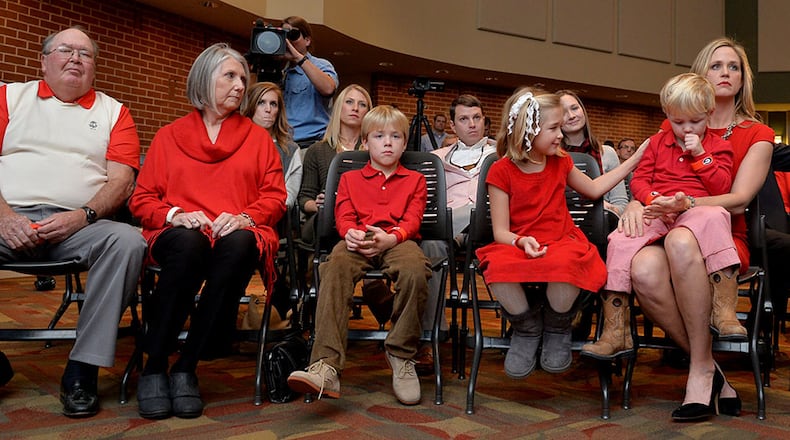Kirby Smart had a plan. Not the usual plan for a college football player, not “I’m going to the NFL and I’m going to be a star!” but the more realistic one of earning his degree, using his connections from Georgia and finding employment in the real world.
“Something in finance,” Smart said Monday. “I might’ve called you for some money. Would you give me any, Jeff?”
At which point I informed the new Georgia coach of my modest portfolio.
Coaching: Not in Smart’s plan. When he got cut by the Indianapolis Colts as an undrafted free agent in 1999, he didn’t expect to return home to Georgia and weigh opportunities in the business world, only to then stun his parents (and probably himself) by instead deciding to be a coach. At Valdosta State. For a whopping salary of $10,000.
“I was in charge of salary cap, in charge of academics, because you had to chop up scholarships,” Smart said. “So I got to use some of my finance (education).”
I think he was making a joke.
Smart has people to count the dollars now. He was one of the nation’s highest paid assistants as Alabama’s defensive coordinator at $1.5 million per year and will make $3.75 million annually, plus bonuses, as Georgia’s new head coach. He continues trying to cram both jobs into one day, having turned from recruiting in Athens to preparing for the Cotton Bowl against Michigan State, the winner of which advances to college football’s championship.
“One day at a time, brother. One day at a time,” Smart said when asked about time management struggles. “There’s light through the tunnel, I keep telling myself.”
This wasn’t the plan. Smart’s parents were modestly salaried educators. His father was a long-time high school coach. Sonny Smart didn’t necessarily oppose his son going into coaching but he thought he could do better with his degree.
“I knew he had a knack for it,” Sonny said by phone from his North Georgia home. “He was like a coach on the field from the time he was 10. When the Colts cut him, he had some good business opportunities and he was leaning in the direction. But somewhere along the way he changed his mind. One thing you learn when you have kids is you can’t predict what they’re going to do.”
When asked if he was worried his son was making the wrong decision, Sonny Smart said, “No. But if anything was on my mind, it was that he wasn’t going to make much money. Who in the world thought in 1999 that coaches would get these salaries?”
Smart said coaching “was in my DNA. I had the passion.”
He is the coach’s son.
He played for Sonny at Bainbridge High School. He exuded those rare organizational skills at an age when most kids were bouncing off walls with sugar rushes.
“You know how there’s always that one kid who lined everybody up when it was time to play games? That was Kirby,” Sonny said. “He always had a good understanding of everything that was happening, no matter what the sport was.”
When Smart took the Valdosta State job, he would frequently phone his father to ask about plays or schemes.
The son says: “I’ve never stopped calling him to ask questions because he’s a wealth of knowledge.”
The father says: “For a year or two he would call me. But he passed me by in about two years.”
The son says: “I’ve got a lot of respect for high school coaches. They don’t do it for the money, they do it for the love of the game and a lot of those coaches are just as good or better than me, but they weren’t given the same opportunities.”
The father agrees. Kirby Smart knew when to go, where to go, who to work for.
He went from Valdosta State (two years) to a grad assistant under Bobby Bowden at Florida State (two years) to working for Nick Saban at LSU (one year) to Mark Richt at Georgia (one year) to Saban again with the Miami Dolphins (one year) before finally stretching and growing with Saban a third time at Alabama (nine years).
There were chances to leave Alabama, but none of the jobs felt right. He also never believed that taking a head coaching job at a mid-major would necessarily prepare him for a major conference job any better than watching Saban operate and being part of the winning process at Alabama.
The father agrees.
“He’s been in every situation,” Sonny Smart said. “He was at Florida State when Coach Bowden was kind of at the end. Then he goes to LSU when they had just won a national championship. Then he goes to Alabama when they’re down and coming off probation. He’s been there from the start with Coach Saban. He’s as ready as he’ll ever be to be a head coach.”
The second plan has worked out fine.
About the Author




